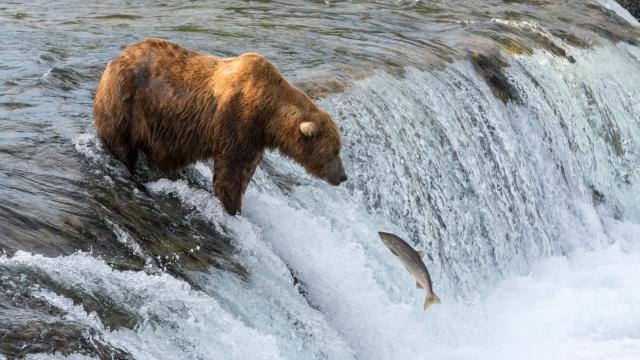You may be familiar with the Big Buck Hunter bonus level where you pump a few dozen rounds into salmon flopping out of the river while grizzlies look on. This is not an especially good bonus level (I prefer the one with the basketballs or the electric eels), but it would be much worse if you needed to shoot elderberries.
Image: Christoph Strässler/Flickr
The level might need an incredibly boring update for some future Big Buck Hunter sequel as the climate changes. New research analysed climate’s influence on the food choices that Kodiak brown bears make; during warmer years, the bears chose elderberries instead of salmon when the berry ripening season and salmon spawning season occur simultaneously. These timing changes can throw entire food webs out of balance. The Atlantic’s science writer Ed Yong summarises it in a tweet:
Climate change -> warmer spring -> berries ripen earlier -> bears abandon salmon for berries -> tons of rotting fish https://t.co/YbrDIQdMBQ
— Ed Yong (@edyong209) August 21, 2017
The researchers surveyed a Kodiak brown bear population in Alaska, calculated elderberry ripening dates, analysed bear poop, and estimated salmon abundances to create a picture of how the relationships changed over time. It seemed to them that the more ripe elderberries there were near the stream, the fewer bears went hunting for the fish. Warmer years move the elderberry season earlier to overlap with the salmon species, so the bears chose the less calorie-dense but more nutrient-rich elderberries over the salmon protein and fat.
More importantly, the analysis suggests that this overlap will occur more often. “If these trends continue, by 2070, the average onset of berry availability would occur during the average peak of salmon availability,” they write in the paper published yesterday in the Proceedings of the National Academy of Sciences, implying that bears could pick berries over salmon more often in the future.
Yong’s story in The Atlantic includes speculation as to what this means for the bears: Maybe they will be worse off during hibernation from switching to a less fatty food, for example. Or maybe other animals such as gulls and smaller fish will miss out on the salmon scraps the bears leave over.
But more importantly, there are probably a lot of other places where the changing climate or human activity messes with entire food webs and ecosystems. On the California Channel islands, for example, the introduction of the feral pigs led to more golden eagles to prey on the pigs, and therefore more eagles preying on the island’s native foxes. The authors write: “We suggest that similarly strong and under appreciated responses are occurring elsewhere as climate change reschedules species interactions across ecosystems.”
[PNAS]
